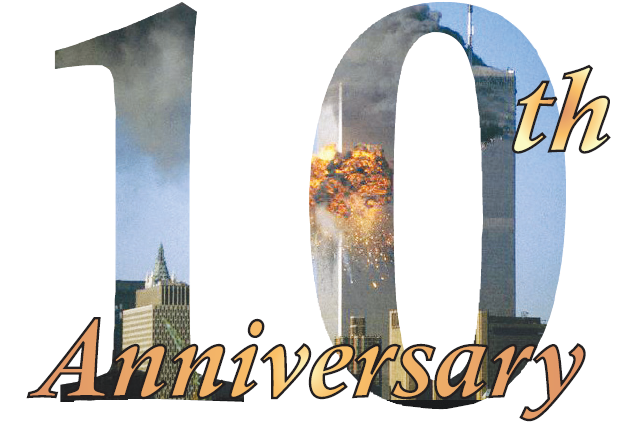Ten years ago, a tragedy occurred that would forever change the history of the United States of America. On Sept. 11, 2001, the World Trade Center was destroyed by a terrorist attack. This event, as horrible as it was, created a newfound sense of unity throughout the United States. Everyone remembers where he or she was when the attacks occurred; they affected everyone in the United States and the world profoundly, even today.
I remember exactly what I was doing when I heard about the attacks. I was in third grade, doing classwork, when my teacher started receiving numerous phone calls from the main office. Parents had arrived to pick up their children from school. I was confused. I did not know where my classmates were going, but soon enough, one of the phone calls was for me. I went down to the main office and my mother and brother were there waiting for me. I asked my mom what had happened and she told me that there had been a terrorist attack in the city. I was so scared that the terrorists were going to bomb my school or home. My dad was in the hospital at the time and he was supposed to be discharged that day, and we were really nervous because we thought that he would not be let out due to the attacks. Luckily, however, my dad was discharged later that day.
The aftereffects of 9/11 also had a huge impact on my family. My dad and my uncle are both members of the New York City Police Department and were therefore involved in the cleanup of ground zero. The toxic chemicals in the air had negative health effects on both of them. My uncle contracted lupus from his work at ground zero. Along with the health effects, they saw firsthand the destruction that had occurred on this day. Their experiences will certainly stay with them for the rest of their lives.
One interesting account of 9/11 was that of Mahjabeen Rafiuddin, Rollins’ director of Multicultural Affairs. When the attacks occurred, Rafiuddin was working for the National Conference for Community and Justice (NCCJ). The aim of this company is to build community through the sharing of cultures in the U.S. The attacks were professionally divisive for Rafiuddin because they led people to fear Muslims. It also affected her on a personal level because she and her family are Muslim. Her brothers were the same age as the terrorists at the time, which caused a lot of worry throughout the family. Hate crimes were on the rise and her brothers and father were also called in for Special Registration with the FBI. During Special Registration, the men were called in for severe interrogation because of their race. Special Registration was a covert operation because, in many ways, it was a huge human rights violation. Rafiuddin said that although this racial discrimination really terrified her, she and her family were able to understand that in this situation, certain extra precautions needed to be taken in order to insure national security.
Assistant Professor of Political Science Dan Chong also shared an interesting account of that day. When the planes hit, he was walking his three-week old daughter in a stroller at the National Zoo in Washington, D.C., about three miles from where the Pentagon would later be hit.Chong shared his feelings about that day, stating, “I remember having two distinct feelings on that day: sadness for the victims who suffered those horrible crimes, and fear for the world that my daughter would inherit.” At the time, Chong was studying asymmetric war and conflict resolution in graduate school. This made him think about how awful it would be if the United States overreacted by restricting human rights and rushing to war with Muslim nations, because this would be the exact reaction that the terrorists would be seeking.
Scott Alfano, Crummer student and Bronx native, was in New York City when the attacks occurred. He was in his first week of 10th grade at Riverdale Country School in the north Bronx. During homeroom, he and his classmates heard about the first plane hitting and thought it had been an accident. When they heard of the second plane hitting, however, everyone started worrying about family members working in the city. Alfano’s brother-in-law worked in a bank across the street from the towers and it was all he could think about.
Cell towers were overworked in the city, which made contacting others impossible. Classes were canceled at noon that day and did not resume until the following Monday. Students were stranded at school, as buses and the subways were shut down. Alfano had about 15 people come back to his house until they could contact their families. When Alfano heard from his brother-in-law, he discovered that he was physically fine but emotionally scarred forever; he had seen about 25 people jump out of the towers because they knew they had no way out of the building. Like many others that were there, he says, “he can still hear the bodies hitting the ground around him.”
Alfano recalls that the events of 9/11 sadden him much more now than they did back then. It was not until after he left the city that he realized how close he was in comparison to others. He still remembers the missing posters and the people from his apartment building who died in the attacks. This in-voked a huge sense of New York pride in Alfano. He felt a strong connection with others who had lived through the events.
Similarly, Lindsay Gilbert ‘14 experienced 9/11 in New York City. The morning of the attacks, all Gilbert could think about was her after school play date with her best friend, Molly. She distinctly remembers when her school’s director walked into her classroom and summoned her teacher, Erika, into the hallway. One of Gilbert’s classmates, Evan, had major hearing problems and wore an earpiece that was attached to a microphone on Erika’s shirt. Therefore, Evan was able to hear their private conversation. He immediately started crying about what he had heard. When Erika returned, she informed the class that “a bomb had been dropped on the World Trade Center.” Gilbert did not know how to react to this level of tragedy. She was soon informed that she would not be going home with Molly. She would instead be spending the evening with her neighbors. That evening, memories of the World Trade Center came flooding back to Gilbert. She realized that these buildings, along with a family friend who had been killed in the attacks, were gone forever.
This had a profoundly traumatic effect on her. Gilbert writes, “September 11, 2001 is a day I will never forget. I started off the day a girl engulfed in fantasies of a play date, and ended the day in an array of emotions that would further shape the person I am today.”
Meredith Hein, assistant director of the Office of Community Engagement, had just moved to Orlando in July 2001 to begin her journey at UCF. She received a call from her mother shortly after waking up for work. She was instantly alarmed due to the fact that her whole family was from New York and her uncle still lived there. She went to work, but everyone’s focus was on the television coverage of the attacks. After 30 minutes, the workers were sent home. She returned home and watched the alarming news coverage which informed her that local theme parks were listed as potential terrorist targets. She was bewildered and had no idea what she could possibly do. In the end, Hein found that her family was safe, but it was still a bittersweet reminder that so many people were not.
First-year student David Matteson was also in the Orlando area that day. He was in third grade and was told to stay inside because smoke from New York City was polluting the air. Matteson recalls that he should have known better than to trust this information, but fear was enough to paralyze all of the students in his school. All they were told was that they were on “lockdown.” His teacher, Mrs. Hackett, occasionally left the classroom to watch the news and returned with tears in her eyes. The students did not know why she was crying, yet they were still upset about the unknown situation. Matteson did not find out what was going on until his mother picked him up and told him that it had been a terrorist attack.
Even then, he did not understand the concept of terrorism. Being a Floridian, he assumed she was talking about tourists. Matteson cried that night, remembering his visit to New York City the previous summer and coming to the sad conclusion of how cruel a place this world can sometimes be.
First-year student Ariella Lvov recalls that on the morning of 9/11, President Bush was supposed to come visit her elementary school in Sarasota.The students were kept in school but the president did not arrive. The students were confused and did not know what was happening. Lvov walked outside after school to find police cruisers everywhere. It was public knowledge that Sarasota was Bush’s location for the day, so police were worried that the terrorists would strike there next. Unusually, Lvov’s mother picked her up from school that day. They returned home immediately and continued to watch the new for the remainder of the day.
Although Sept. 11 affected everyone uniquely, it simultaneously brought the country together. Bob Dylan once wrote that “people who suffer together have stronger connections than people who are most content.” I believe that this is exactly the connection that all those affected by 9/11 share. It is through our suffering that we are brought together. The fact that everyone had to live through the same traumatic events created a sense of unity that could not have existed before. Although the terrorists’ aim was to break the nation apart, what they essentially did was the exact opposite. They created a new sense of national pride and camaraderie and reminded us all what it is to be American.







Be First to Comment